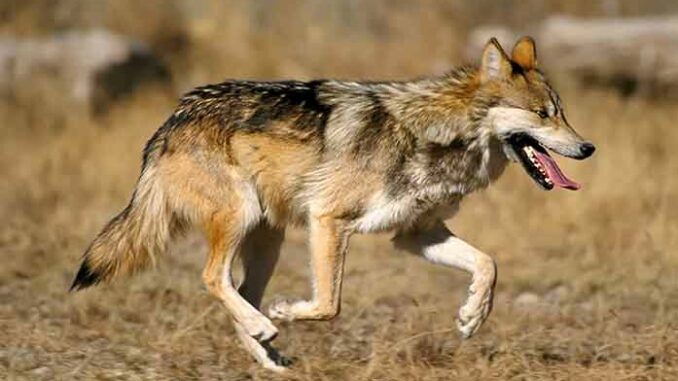
When the West was being settled, cattlemen exterminated wolf packs to protect their livestock. The re-introduction of wolves by our wild life preservationist’s has proven to be disastrous for our cattle ranchers. A direct kill on cattle and their calves by wolves is quite horrific to the animal and to the cattle owner. Wolves are predatory animals that will inflict serious wounds to the cattle. These wounds are slow to heal and require expensive veterinary treatment. Cows that are carrying new life are typically targeted by the wolves and are chased until cow drops from exhaustion and aborts the calf. Loss of cow and what was to be a new calf to the wolf.
A re-introduction of wolves to areas that provide a joint use of land for recreational use, camping, fishing, etc., will introduce a tragedy to family campers and fisherman. The wolf preservationists have no understanding on how costly it is to the cattle ranchers to have wolves reintroduced. The re-introduction of wolves literally bankrupts the cattle ranchers. For instance, a retired civil engineer from Baker City, Oregon, who surrounds himself with friends who are cattle ranchers, sums it up: “I am not a wild eyed lunatic, but a logical thinker with practical expertise to design facilities, infrastructures and roadways for the public. I believe that if big city people in Portland, Oregon want wolves, they should have all they want, we in Eastern Oregon don’t want the wolves and can’t afford them.”
The proposed introduction of wolves in northern Arizona will be a disaster for our cattle ranchers who have built thriving cattle ranches. The entire Rocky Mountain region from Canada, south to Mexico and westward to the Pacific Coast has been infected with an intellectual virus that would like public and private property to re-introduce all the wild life that Lewis and Clark experienced as they blazed a trail across our great country.
Many good things have happened with re-introduction of wild-life back into the wild. Take the mighty Condor, raised in captivity and then re-introduced into the Grand Canyon National Park. Doing this has saved the species and has made for great enjoyment of the tourists on seeing the Condors fly and thrive.
Wildlife management of public and private owned lands require a fruitful balance to harvest the timber and develop the earth resources to ensure for community growth that enjoy a prosperous economy.
Cattle ranchers are confronted with radical enviros, who, in addition to re-introducing wolf packs in the grazing land, want to stop the raising of cattle on public lands. In the 2005 summer edition of the “Range Magazine”, Cindy Coping wrote an article on a fed-up Arizona cattle ranch family sued the Center for Biological Diversity (CBD) on lies and misinformation regarding their land which led to this families grazing rights to be cancelled. This all began in 1978 when the Chilton Ranch and Cattle Company left Northern Arizona which is where this family had raised cattle since 1888. In 1978, the Chilton’s purchased the Diamond Bell Ranch located southwest of Tucson. 1991, the Chilton’s purchased the Montana Allotment in the Coronado National Forest, between the Mexican Border and the small town of Arivaca. The Chilton family had prospered in cattle ranching as leaders on range land sustainability. Providing pasture land a 20 months rest out of 24 to increase perennial grass cover and rapidly recruit riparian vegitation.to increase grass growth. In 1997 the CBD and other forest guardians requested the Forest Service to cancel the Montana Grazing permit.
On December 17, 2001 the Ninth Circuit Court of Appeals proclaimed the U.S. Fish and Wildlife Service (FWS) biological opinion to cancel the Chilton’s Montana Allotment “was arbitrary, capricious and unlawful.” The Chilton’s were overjoyed with this landmark decision.
The Chilton’s wanted to expose the way the CBD and the forest guardians rob the lively-hood of ranchers, miners and developers of well- paid employment. This is when the Chilton’s decided to sue the CBD. During the trial, the Chilton attorney, Kraig Marton won the Chilton trial on the key issue that is the Justice System that is the watch dog over CBD. The jury awarded the Chilton’s $100,000 actual damages and $500,000 in punitive damages. A copy of Cindy Copings article, “GOT’CHA!” is well worth the read. This article, the 9th Circuit court of Appeals landmark decision and the Chilton’s defamation suit against CBD gives hope that relentless attacks against private enterprise can be stopped.
The crusade against cattle ranchers goes well beyond the re-introduction of wolves. The anti-enterprise enviros have quarantined many communities from strong investments to sustain an area. Investments in mines, retirement communities and even the funding of necessary infrastructures and roadways are all being delayed by our anti-enterprise enviros who continue to try to put a stop on any and all growth to small struggling communities.
Harmful re-introduction of wolves places attack on forest management, mining, real estate development and promoted by frivolous lawsuits can be reduced with lessons learned from the Chilton Cattle Ranch.
